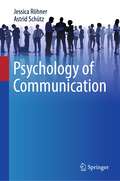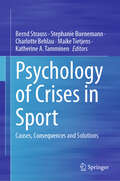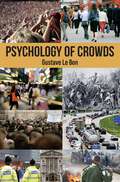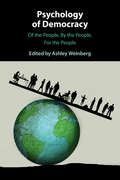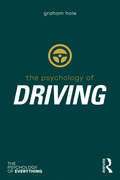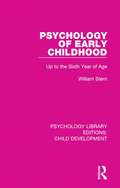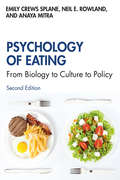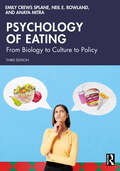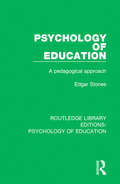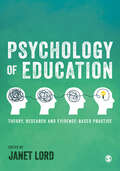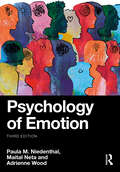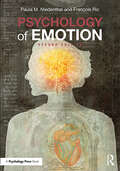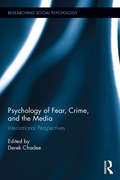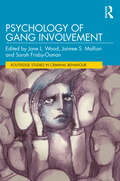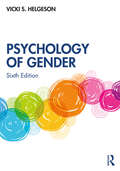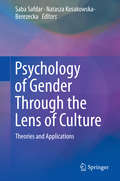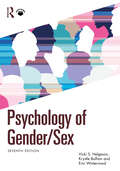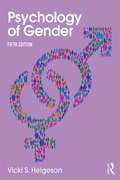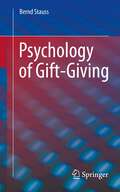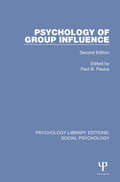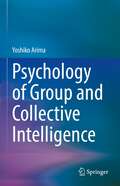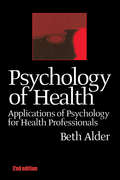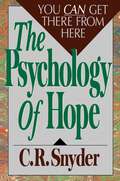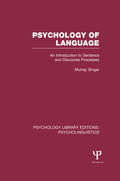- Table View
- List View
Psychology of Communication
by Jessica Röhner Astrid SchützThis successful textbook on the psychology of communication explains - here in English for the first time - how human communication works in a very understandable way. It begins with the explanation of central terms and the explanation of known communication models (e.g. the models according to Schulz von Thun, Watzlawick, Hargie and colleagues), then describes means of non-verbal and verbal communication and ends with a clear and structured summary of communication forms. Concrete fields of application, stumbling blocks (e.g. intercultural differences in communication), practical examples and digressions in the book round off what has been read and consolidate what has been learned. In addition, free learning materials are available on the Internet with which readers can test their knowledge acquisition.
Psychology of Crises in Sport: Causes, Consequences and Solutions
by Bernd Strauss Stephanie Buenemann Charlotte Behlau Maike Tietjens Katherine A. TamminenThe book includes ideas and concepts from psychology in general, particularly sport psychology, and communication sciences, as well as applied sport psychology and case studies. In each chapter, the reader will first learn the theoretical and empirical background of concepts related to crises, and second, they will be introduced to how to apply this knowledge and methods to prevent and cope with crises. Throughout the book, well-known examples and case studies are addressed to gain a full understanding of crises.
Psychology of Crowds
by Gustave Le BonIn this clear and vivid book, Gustave Le Bon throws light on the unconscious irrational workings of group thought and mass emotion as he places crowd ideology in opposition to free-thinking and independent minded individuals. He also shows how the behaviour of an individual changes when she/he is part of a crowd.Le Bon was an eminent psychologist and sociologist. The ideas le Bon explores in this book are extremely relevant to today's society and were of pivotal importance in the early years of group psychology: Sigmund Freud's Massenpsychologie und Ich-Analyse (1921); (English translation Group Psychology and the Analysis of the Ego, 1922) was based on Le Bon's work. Applications include financial market behaviour and political delusions.The original of this work, La Psychologie des Foules, was first translated anonymously into English possibly by a group of French students. Sparkling Books has corrected errors and anomalies in the original translation by reference to the Alcan edition. We have shortened a few passages but maintained the original footnotes and have added some footnotes of our own. Contents>Book One - The Mind of Crowds General characteristics of crowds and the psychological law of their mental unity The sentiments and morality of crowds The ideas, reasoning power, and imagination of crowds The religious nature of crowd convictions Book Two - The Opinions and Beliefs of Crowds Indirect factors of the opinions and beliefs of crowds Direct factors of the opinions of crowds The leaders of crowds and their means of persuasion Fixed beliefs and changeable opinions of crowds Book Three - The Classification and Description of the Different Kinds of Crowds The classification of crowds Crowds committing crimes Criminal juries Electoral assemblies
Psychology of Democracy: Of the People, By the People, For the People
by Ashley WeinbergDemocracy was forged in the furnaces of oppression, whether combatting tyranny or affirming the rights of the individual. As democracy is under threat in many parts of the world, there has never been a more urgent need to understand political thoughts and behaviours. This lucid and accessible book brings together a global group of scholars from psychology, political science, communication, sociology, education and psychiatry. The book's structure, based on Abraham Lincoln's well-known phrase 'Of, by and for' the people, scrutinises the psychological factors experienced by politicians as representatives 'of' the electorate, the political institutions and systems devised 'by' those we elect, and the societies that influence the context 'for' us as citizens. From trust to risk, from political values to moral and religious priorities, from the personality and language of leaders to fake news and anti-democratic forces, this book provides vital new insights for researchers, politicians and citizens alike.
Psychology of Driving (The\psychology Of Everything Ser.)
by Graham J. HoleDo we become better or worse drivers as we age? Why do we indulge in risky behaviour when driving? Will technology remove the human role in driving forever? The Psychology of Driving is a fascinating introduction into the psychological factors at play when people get behind the wheel. Exploring the role of personality traits and cognitive functions such as attention in driving, the book considers why human error is most often to blame in road accidents, and how we can improve driver safety. The book debunks the myth that men are better drivers than women and considers why some people indulge in knowingly risky behaviour on the road, including using mobile phones and drink/drug-driving. In a time when driverless cars are becoming a reality, The Psychology of Driving shows us how human behaviour and decisions can still affect our lives on the road.
Psychology of Early Childhood: Up to the Sixth Year of Age (Psychology Library Editions: Child Development #16)
by William SternOriginally published in 1924, this sixth edition published in 1930 is thoroughly revised and updated to take account of the important advances in the field of child psychology at the time. In this new edition the personal standpoint is emphasized, while at the same time other psychological theories such as mental psychology, form psychology, psychoanalysis and individual psychology have been exhaustively treated, criticized and discussed in contradistinction to the theory of personality. Much fuller treatment has been given to the experimental examination of young children for purposes of research and tests, since it is in this form of investigation that major advances had been made. Today it can be read and enjoyed in its historical context.
Psychology of Eating: From Biology to Culture to Policy
by Neil Rowland Emily Splane Anaya MitraThe Psychology of Eating is the essential multi-disciplinary introduction to the psychology of eating, looking at the biological, genetic, developmental, and social determinants of how humans find and assimilate food. Thoroughly revised and updated, the new edition brings multi-faceted expertise to the topic of normal and dysfunctional food intake, juxtaposing "normal" eating, eating in environments of food scarcity, and the phenomenon of "abnormal" eating prevalent in many modern-day developed societies. Eating disorders are not a focus, but also emerge from, this approach. Key features include: A new expanded section considering the roles of business and government in creating and potentially solving the issue of "abnormal" eating Learning objectives, talking points, and end-of-chapter glossaries Chapter-by-chapter self-assessment questions. With questions of food production, food choice, and environmental sustainability becoming more critical in an increasingly populated world, this is crucial reading for undergraduate courses in Psychology and other disciplines with a holistic and critical thinking approach to the psychology of food intake.
Psychology of Eating: From Biology to Culture to Policy
by Anaya Mitra Neil E. Rowland Emily Crews SplaneThe Psychology of Eating is the essential multidisciplinary introduction to the psychology of eating, looking at the biological, genetic, developmental, and social determinants of how humans find and assimilate food.Thoroughly revised and updated, this new, third edition brings multifaceted expertise to the topic of normal and dysfunctional food intake, juxtaposing ‘normal’ eating, eating in environments of food scarcity, and the phenomenon of ‘abnormal’ eating prevalent in many modern-day developed societies. The book includes some discussion of eating disorders but takes a much broader approach to the psychology of eating. Key updates in this edition include: A new discussion of food allergies. A fully updated chapter on eating disorders, which includes discussion of binge-eating. Greater focus on junk food addition and updated information on epigenetics and the microbiome Featuring student-friendly materials such as learning objectives, talking points, glossaries, and self-assessment questions, this book is essential reading for students of psychology, eating behavior, or health sciences. It will also be useful reading for professionals in health psychology and anyone supporting those with eating disorders and obesity.
Psychology of Education: A Pedagogical Approach (Routledge Library Editions: Psychology of Education)
by Edgar StonesOriginally published in 1979, this title is based upon Professor Stones’ extensive work with practising and student teachers. His overriding concern is with the contribution of psychology to pedagogy to help practitioners improve their practice and theorists test their theories. He develops the thesis that teaching involves the teacher in psychological experimentation. Thus one of the most important laboratories for testing the application of learning theories is the classroom. The adoption of this view offers the potential for transforming teaching and our understanding of human learning. Unlike the majority of books in the field of educational psychology at the time it is not a synoptic anthology of the writings of the current gurus in the field or its close neighbours. Instead, guides are given to teachers/experimenters to plan, try out and evaluate their teaching/experimenting. The central theme adopted at the outset and held throughout the book is the improvement of teaching through the explicit, informed use of psychopedagogical principles.
Psychology of Education: Theory, Research and Evidence-Based Practice
by Janet LordEducational psychology applies psychological theories, ideas and methods to education and to understandings of teaching and learning, both in the classroom and beyond. As last few months have shown, psychology can have a huge impact both on and in education. This practical guide applies evidence-based practice to real-life scenarios over a broad range of topics in the psychology of education, from its historical roots to digital learning, and from cognitive development to diversity and cultural differences. Essential reading for students of education, psychology, and educational psychology, as well as teacher trainees and practising educators working with learners of any age, this textbook offers a variety of perspectives and advice on contemporary issues in educational psychology. Janet Lord is Faculty Head of Education at Manchester Metropolitan University.
Psychology of Education: Theory, Research and Evidence-Based Practice
by Janet LordEducational psychology applies psychological theories, ideas and methods to education and to understandings of teaching and learning, both in the classroom and beyond. As last few months have shown, psychology can have a huge impact both on and in education. This practical guide applies evidence-based practice to real-life scenarios over a broad range of topics in the psychology of education, from its historical roots to digital learning, and from cognitive development to diversity and cultural differences. Essential reading for students of education, psychology, and educational psychology, as well as teacher trainees and practising educators working with learners of any age, this textbook offers a variety of perspectives and advice on contemporary issues in educational psychology. Janet Lord is Faculty Head of Education at Manchester Metropolitan University.
Psychology of Emotion
by Paula M. Niedenthal Adrienne Wood Maital NetaPsychology of Emotion reviews both theory and methods in emotion science, exploring findings about the brain; the function, expression, and regulation of emotion; similarities and differences due to gender and culture; the relationship between emotion and cognition; and emotion processes in groups. With a focus on emotion in the typically developing individual, the text's main themes include conscious and unconscious processes; the ways in which emotions arise in, and are constrained by, social situations and social processes; the regulation and sharing of emotion and their effects on mental health; and the manner in which culture (including subculture) shapes or moderates some of these processes. A defining assumption of the book, distinguishing it from much of its competition, is that both biology and social situation are important forces in the experience of emotion.Key features of the third edition include: Emphasis on cutting-edge research and insights from contemporary affective science Developmental Details sections, offering in-depth exploration of chapter themes within crucial stages of the human lifespan Key concepts highlighted with bolded vocabulary and integrated Learning Links, providing clear, illustrative connections to each chapter's core topics Comprehensive in its scope yet eminently readable, Psychology of Emotion serves as an ideal introduction for undergraduate students to the scientific study of emotion.
Psychology of Emotion: 2nd Edition
by Paula M. Niedenthal François RicSince the turn of the twenty-first century, the psychology of emotion has grown to become its own field of study. Because the study of emotion draws inspiration from areas of science outside of psychology, including neuroscience, psychiatry, biology, genetics, computer science, zoology, and behavioral economics, the field is now often called emotion science or affective science. A subfield of affective science is affective neuroscience, the study of the emotional brain. This revised second edition of Psychology of Emotion reviews both theory and methods in emotion science, discussing findings about the brain; the function, expression, and regulation of emotion; similarities and differences due to gender and culture; the relationship between emotion and cognition; and emotion processes in groups. Comprehensive in its scope yet eminently readable, Psychology of Emotion serves as an ideal introduction for undergraduate students to the scientific study of emotion. It features effective learning devices such as bolded key terms, developmental details boxes, learning links, tables, graphs, and illustrations. In addition, a robust companion website offers instructor resources.
Psychology of Fear, Crime and the Media: International Perspectives (Researching Social Psychology)
by Derek ChadeeThe media continue to have a significant persuasive influence on the public perception of crime, even when the information presented is not reflective of the crime rate or actual crime itself. There have been numerous theoretical studies on fear of crime in the media, but few have considered this from a social psychological perspective. As new media outlets emerge and public dependence on them increases, the need for such awareness has never been greater. This volume lays the foundation for understanding fear of crime from a social psychological perspective in a way that has not yet been systematically presented to the academic world. This volume brings together an international team of experts and scholars to assess the role of fear and the media in everyday life. Chapters take a multidisciplinary approach to psychology, sociology and criminology and explore such topics as dual process theory, construal level theory, public fascination with gangs, and other contemporary issues.
Psychology of Gang Involvement (Routledge Studies in Criminal Behaviour)
by Jane L. Wood Jaimee S. Mallion Sarah Frisby-OsmanPsychology of Gang Involvement expands existing knowledge by applying psychological knowledge to gangs, including how gang members think, their mental and emotional well-being, and their perceptions of gang involvement, as well as issues relating to gang prevention and intervention strategies. This book offers readers a clearer understanding of the important role that social psychological processes play in the formation and maintenance of gangs and gang membership. It will enhance readers’ understanding of gang members’ social cognition, emotional intelligence, well-being, and mental health, as well as how these factors potentially promote and sustain individual gang involvement. Readers will discover also how these important psychological characteristics vary according to an individual’s commitment to a gang. Organized in three sections, the first focuses on issues relevant to theoretical perspectives of gang involvement. Chapters include detailed examinations of a gang member’s experiences and the implications of these for theoretical development, and considerations of the importance of social and psychological issues such as group processes and levels of commitment to gang membership to, understand and explain involvement in gangs. The second section centers on issues such as adverse childhood experiences and trauma, and examines their links to male and female gang membership as potential risk factors and outcomes of gang involvement. The section concludes by contemplating how the mental health, traumatic experiences, and involvement in violence compares between gang members and other violent men in adulthood. The final section considers current responses to gang membership by evaluating individual and group-based approaches to gang prevention and intervention strategies, and concludes with a theoretical conceptualization of how a strengths-based approach could work to reduce gang involvement. This book will be a useful text for a wide range of readers interested in, or working with gang members, including academics and students, practitioners, youth workers, clinicians, and criminal justice agents.
Psychology of Gender
by Vicki S. HelgesonNoted for its fair and equal coverage of men and women, Psychology of Gender reviews the research and issues surrounding gender from multiple perspectives, including psychology, sociology, anthropology, and public health. Going far beyond discussions of biological sex and gender identity, the text explores the roles that society has assigned to females and males and the other variables that co-occur with sex, such as status and gender-related traits. The implications of social roles, status, and gender-related traits for relationships and health are also examined. The text begins with a discussion of the nature of gender and development of gender roles, before reviewing communication and interaction styles and how they impact our friendships and romantic relationships. It concludes with an exploration of how gender influences both physical and mental health. New to the 6th Edition: Emphasis on the intersectionality of gender, considering it as a part of wider social categories such as race, ethnicity, social class, and gender identity Recognition of the increasingly prevalent view that gender is nonbinary Extended coverage of LGBTQ individuals, their relationships, and their health Expanded discussions of key issues including gender-role strain, gender fluidity, women and STEM, parenthood, balancing family and work demands, online communication, and sexual harassment Accompanied by a comprehensive companion website featuring resources for students and instructors, alongside extensive student learning features throughout the book, Psychology of Gender is an essential read for all students of gender from psychology, women’s studies, gender studies, sociology, and anthropology.
Psychology of Gender Through the Lens of Culture
by Saba Safdar Natasza Kosakowska-BerezeckaThis unique collection brings a rarely-seen indigenous and global perspective to the study of gender and psychology. Within these chapters, researchers who live and work in the countries and cultures they study examine gender-based norms, values, expression, and relations across diverse Western and non-Western societies. Familiar as well as less-covered locations and topics are analyzed, including China, New Zealand, Israel, Turkey, Central America, the experience of refugees, and gendered health inequities across Africa such as in the treatment of persons with HIV. Included, too, are examples of culturally appropriate interventions to address disparities, and data on the extent to which these steps toward equality are working. Structurally, the volume is divided into three sections. The first two parts of the book take readers on a journey to different regions of the world to illustrate the most recent trends in research concerning gender issues, and then outline present implications and future prospects for the psychological analysis of both gender & culture. The third section of the book has an applied perspective and focuses on the cultural norms and values reinforcing gender equality as well as cultural and social barriers to them. A sampling of the topics covered: Sexual orientation across culture and time. A broader conceptualization of sexism in Poland. An analysis of gender roles within the family in Switzerland Modern-day dowries in South Asian international arranged marriages. The current state of gender equality in the United States of America. Socio-cultural determinants of gender disparity in Ghana. Psychology of Gender Through the Lens of Culture is a milestone toward core human rights and goals worldwide, and a critical resource for psychologists, sociologists, anthropologists, gender studies researchers, public policy makers and all those interested in promoting gender equality throughout the world.
Psychology of Gender/Sex
by Vicki S. Helgeson Krystle M. Balhan Erin WinterrowdNow in its 7th edition, Psychology of Gender/Sex reviews the research and issues surrounding gender from multiple perspectives, including psychology, sociology, anthropology, and public health. It explores the ways in which gendered experiences are varied across development, social identities, and locations, focusing on the construct of gender/sex, as well as the implications of gender/sex for school, work, relationships, and health.Going far beyond discussions of biological sex and gender identity, the text explores the gender/sex roles that society assigns to people, the various ways in which people break and bend those roles, and the other variables that co-occur with gender/sex, such as status and power.Key features of this edition include: Updated and integrated coverage of LGBTQ+ issues, identities, and experiences Expanded emphasis on the intersectionality of gender/sex Renewed focus on abortion/bodily autonomy and reproduction Expanded discussions of emerging topics such as online interactions and social media, the impact of COVID on gender/sex inequalities, gender/sex in the workplace, and social justice and activism Engaging and readable, Psychology of Gender/Sex is an essential text for all students of gender from psychology, women’s studies, gender studies, sociology, and anthropology.
Psychology of Gender: Fifth Edition
by Vicki S. HelgesonNoted for its fair and equal coverage of men and women, this book reviews the research and issues surrounding gender from multiple perspectives including psychology, sociology, anthropology, and public health, with an emphasis on the interaction between biological and social theories. The implications of social roles, status, and gender-related traits on relationships and health that are central to students' daily lives are emphasized throughout. Students learn how to distinguish the similarities and differences between the sexes and the theories that explain the differences. Methodological flaws that may impact the observance of sex differences are also examined. Learning activities and pedagogical tools included in the text: Do Gender exercises which provide an opportunity to test hypotheses and explore data Sidebars on special interest topics and numerous visuals?that bring the studies to life Take Home Points that summarize key concepts in bulleted format Boldfaced key terms and definitions, chapter summaries, discussion questions, and suggested readings which help students review the material New to the 5th Edition: Expanded sections on cohabitation, homosexuality, online relationships, social media influences, single-sex classrooms, sex differences in math abilities, and gender implications of divorce on health Expanded coverage of gender and parenting, gender and the workplace, gender and power, and balancing work and family An expanded intersectional approach that highlights how gender is connected to social class, race, and ethnicity, including more coverage of gender system justification theory Coverage of transgender issues including recent changes in the DSM guidelines Streamlined discussions to further engage students to think about gender issues A companion website at www.routledge.com/cw/Helgeson where instructors will find Power Point slides, multiple choice quizzes, and short answer questions with suggested answers for each chapter; and students will find flashcards of key terms, chapter outlines, and links to related websites and further reading Divided into three parts, each section builds on the previous one. First, gender and the development of gender roles across cultures are introduced. Scientific methods used to study gender, attitudes toward gender, and the latest data and theories on sex differences in cognitive, social, and emotional domains are then introduced. Theories of gender-role development, including evolutionary, social learning, social role, and gender schema theories are reviewed along with the implications of gender on achievement. Part one reviews the key information on the similarities and differences between the sexes and the theories that explain the differences which lay the foundation for the remainder of the book. Part two examines the role of gender in relationships including communication styles and the impact of these interactions on friendship and romantic relationships. The third part examines the role of gender on physical and mental health. The effects of marriage and parenting on health are reviewed, including domestic abuse, along with how gender affects the association between work and health. This is an ideal text for upper level gender-focused courses including the psychology of gender, psychology of women or men, gender issues, and gender, women’s, or men’s studies taught in psychology, women’s studies, gender studies, sociology, and anthropology.
Psychology of Gift-Giving
by Bernd StaussGift-giving is an economically significant area of consumer behavior. For we are constantly buy gifts: for Christmas and Mother’s Day, for birth and baptism, for the start of school and exams, for engagements and weddings, for birthdays or as souvenirs. Moreover, gift-giving is a very important psychological phenomenon, based on voluntariness, but also representing a duty and requiring compliance with rules. Thus, gift giving is by no means always associated with joy, but also with stress in the search for a perfect gift and disappointment when gifts fail.The book presents central results of psychological research on gift-giving. These provide answers to the following questions, among others:What ‘secret’ rules of giving and receiving do we follow?What messages do we send with our gifts?How do certain characteristics - such as the amount of the price or empathy - influence satisfaction with a Gift-giving is an economically significant area of consumer behavior. For we are constantly buy gifts: for Christmas and Mother’s Day, for birth and baptism, for the start of school and exams, for engagements and weddings, for birthdays or as souvenirs. Moreover, gift-giving is a very important psychological phenomenon, based on voluntariness, but also representing a duty and requiring compliance with rules. Thus, gift giving is by no means always associated with joy, but also with stress in the search for a perfect gift and disappointment when gifts fail. The book presents central results of psychological research on gift-giving. These provide answers to the following questions, among others: · What ‘secret’ rules of giving and receiving do we follow? · What messages do we send with our gifts? · How do certain characteristics - such as the amount of the price or empathy - influence satisfaction with a gift? · What mistakes should we avoid when giving gifts in romantic relationships? · When is a monetary gift appropriate and when is it not? The Author Prof. Dr. Dr. h.c. em. Bernd Stauss held the Chair of Service Management at the Catholic University of Eichstätt-Ingolstadt.What mistakes should we avoid when giving gifts in romantic relationships?When is a monetary gift appropriate and when is it not?The presentation of psychological gift-giving research is supplemented by references to gift-giving episodes in fiction by authors such as Paul Auster, Jonathan Franzen, Margaret Mitchell, and Thomas Mann. These illustrate the scientific findings and allow us to emotionally comprehend the experience of giving and receiving.The AuthorProf. Dr. Dr. h.c. em. Bernd Stauss held the Chair of Service Management at the Catholic University of Eichstätt-Ingolstadt.
Psychology of Group Influence: Second Edition (Psychology Library Editions: Social Psychology)
by Paul B. PaulusOriginally published in 1989, this title showcased new developments, providing a systematic and in-depth overview of some of the basic issues in the field of group psychology. Subject areas range from basic group processes to complex interactive phenomena. There are international contributions, with chapters covering the latest developments in the field at the time. The volume provided students and professionals with a comprehensive, coherent, and interrelated picture of the broad scope of group influence processes. The volume was motivated by the belief that group psychology is a central and important activity for social psychology.
Psychology of Group and Collective Intelligence
by Yoshiko ArimaThis book integrates the findings of group research emphasizing “Madness of the Crowd” versus collective intelligence that highlights “Wisdom of the Crowd.” Thus it provides an overview of psychological research on group processes and collective intelligence, analyzing cognitive, social, and structural factors. Chapters address applications of this research to contexts such as organizations and online behavior, and offer guidelines and hands-on demonstrations of psychological principles. The book is highly relevant to students and instructors in personality and social psychology.
Psychology of Health: Applications of Psychology for Health Professionals
by Beth AlderFirst published in 1999. Now this popular textbook has been substantially revised and updated to include: Cutting edge research and data; Twelve chapters - ideal for term/semester teaching; Summaries of psychology theory, clearly explained; Involving and thought-provoking activities and projects; Awareness of the treatment of illness and health issues; Exercises which improve the student's therapeutic skills, making it easier to cope with professional demands and personal pressures. Psychology of Health is aimed at health professional students. Students with no prior experience in the subject will gain valuable knowledge. Relevant courses include nursing, physiotherapy. occupational therapy. speech therapy. podiatry and dietetics.
Psychology of Hope: You Can Get Here from There
by C.R. SnyderWhy do some people lead positive, hope-filled lives, while others wallow in pessimism? In The Psychology of Hope, a professor of psychology reveals the specific character traits that produce highly hopeful individuals. He offers a test to measure one's level of optimism and gives specific advice on how to become a more hopeful person.
Psychology of Language: An Introduction to Sentence and Discourse Processes (Psychology Library Editions: Psycholinguistics)
by Murray SingerOriginally published in 1990, this comprehensive volume addresses the central issues of sentence and discourse processes, with particular emphasis placed on reading and listening comprehension. The text material is accessible to both upper-level undergraduate and graduate students and informative for professionals and educators. In this regard, this uncommon volume identifies the logic of both the specific experimental manipulations that are described, and the more general on-line and memory measures frequently invoked. The principles presented in the text are supported by hundreds of numbered and unnumbered examples, and by precise tables and figures.
